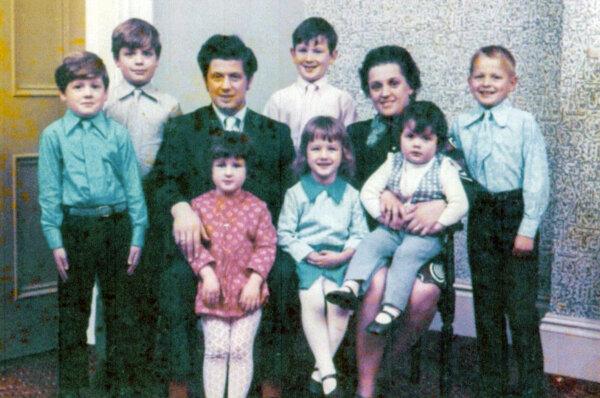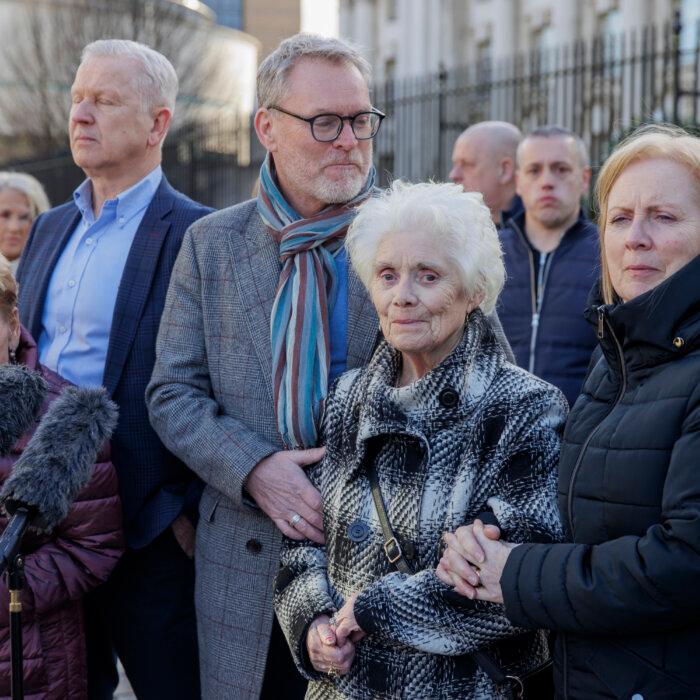The government says it remains committed to the Northern Ireland Troubles (Legacy and Reconciliation) Act after the High Court in Belfast said it was “unlawful” for the legislation to promise conditional immunity.
Mr. Justice Colton said the Independent Commission for Reconciliation and Information Recovery (ICRIR) would not be entitled to offer conditional immunity from prosecution to those who may have committed crimes during The Troubles because that would not be compliant with the European Convention on Human Rights (ECHR).
Martina Dillon, whose husband Seamus was shot by loyalist paramilitaries in 1997, welcomed the judge’s ruling.
Speaking outside the Royal Courts of Justice on Wednesday, Ms. Dillon said: “I have not given up the fight. I have fought for 26 years and I will continue to fight on. I’ll fight until I get truth and justice.”
The Troubles lasted between 1969 and 1998 and more than 3,600 people were killed as a result of attacks by the Provisional IRA, other Irish republican groups, loyalist paramilitaries, and the actions of the security forces.
Although the Good Friday Agreement created a political settlement, it left open the question of how to deal with the many unsolved murders from The Troubles, not to mention controversial killings at the hands of the SAS, the army, and the Royal Ulster Constabulary, the predecessor of the Police Service of Northern Ireland (PSNI).
The Northern Ireland Troubles (Legacy and Reconciliation) Act was controversially passed by Parliament last year.
The act received royal assent in September despite opposition from political parties and campaigners in Northern Ireland, and comes into force on May 1.
It will introduce a guillotine that will prevent the conclusion of ongoing Troubles-related inquests and civil litigation.
The legislation was pushed through following a campaign by Tory MP and former soldier Johnny Mercer, who claimed “vexatious litigation” was harassing veterans who had served in Northern Ireland.
The legislation gives immunity to soldiers, police officers, and paramilitaries who may have committed crimes during The Troubles, on condition they tell the truth at hearings to be held by the ICRIR.
Judge: No Evidence Immunity Will ‘Contribute to Reconciliation’
He added, “There is no evidence that the granting of immunity under the Act will in any way contribute to reconciliation in Northern Ireland; indeed the evidence is to the contrary.”But he said he had no reason to believe the ICRIR could not conduct investigations which would not be compliant with Articles 2 and 3 of the ECHR.
Article 2 of the ECHR enshrines the “right to life” while Article 3 says, “No one shall be subjected to torture or to inhuman or degrading treatment or punishment.”
Mr. Justice Colton also ruled that a clause in the act that prevented any Troubles-related civil litigation after Nov. 18, 2023 was incompatible with human rights laws and should be “disapplied.”
On Monday the family of John Toland and another man, James Loughrey, agreed to an out-of-court settlement with the PSNI and the Ministry of Defence.
The families had claimed there had been collusion between the security forces and the Ulster Defence Association (UDA) paramilitaries but, in settling the case, the PSNI and MOD did not accept liability.

Northern Ireland Secretary Chris Heaton-Harris told the House of Commons on Wednesday, “We will consider Mr. Justice Colton’s findings very, very carefully, but we do remain committed to implementing the Legacy Act.”
Shadow Northern Ireland secretary Hilary Benn said, “What do ministers intend to do about this judgment and how can the commission become operational when one of its central powers has just been struck down?”
Irish Government ‘Not Surprised’ by Ruling
The deputy prime minister of the Republic of Ireland, Micheal Martin, said he was “not surprised” by the High Court ruling.Mr. Martin said, “The Irish government has been consistent on this and and in fact the legal advice that we received and that I received was very clear that the Legacy Act was in breach of the European Convention of Human Rights and was not compliant with Article 2 in particular.”
“The High Court case reflects I think the legal advice that we received also,” he added.
The Irish government has launched a separate legal case against the British government over the Legacy Act, arguing it breaches human rights laws.
An ICRIR spokesperson said: “In its judgment, the court has confirmed that the commission is independent and is capable of carrying out investigations which are compliant with the European Convention on Human Rights. The commission is therefore properly and lawfully established.”
“We will study the court’s judgment in detail and seek to reflect this as we refine our proposals to carry out independent investigations from this summer,” the spokesperson added.







